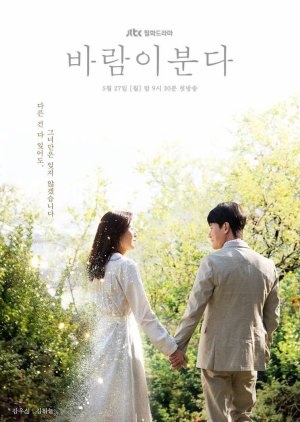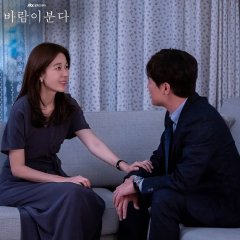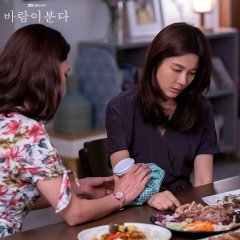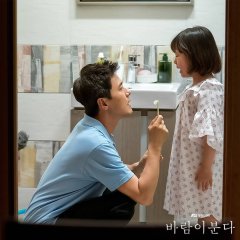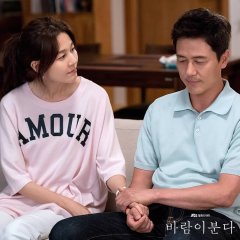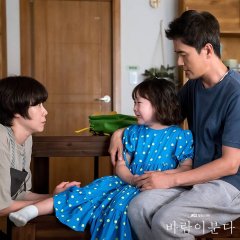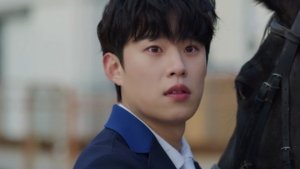 Park Hae Soo and Kim Sung Chul to appear on "Racket Boys"
Park Hae Soo and Kim Sung Chul to appear on "Racket Boys" Há seis anos, casado e feliz Do Hoon foi diagnosticado com a doença de Alzheimer. Sua noiva Soo Jin sonha em construir uma família com ele. Desesperado para que Soo Jin tenha uma vida boa – mesmo que isso signifique que estejam separados – Do Hoon decide que o divórcio é sua única opção. Seis anos depois, o destino os une novamente. Pouco a pouco, eles descobrem que ainda têm sentimentos um pelo outro. Mas isso será suficiente? Muita água passou debaixo da ponte – ou eles vão decidir dar outra chance ao relacionamento deles? (Fonte: Viki) Editar Tradução
- Português (Brasil)
- 中文(简体)
- Русский
- Español
- Título original: 바람이 분다
- Também conhecido como: Balami Bunda , Barami Bunda , The Wind Blows
- Diretor: Jung Jung Hwa, Kim Bo Kyung
- Roteirista: Hwang Joo Ha
- Gêneros: Romance, Drama, Melodrama
Onde assistir O Vento Sopra
Subscription (sub)
Elenco e Créditos
- Kam Woo SungKwon Do HoonPapel Principal
- Kim Ha Neul Papel Principal
- Kim Sung Chul Papel Principal
- Kim Ga Eun Papel Principal
- Lee Joon HyukChoi Hang Seo / "Carlos" [Do Hoon's friend / Izakaya owner]Papel Secundário
- Yoon Ji HyeBaek Soo Ah [Soo Jin's close sister / Japanese chef]Papel Secundário
Resenhas

Esta resenha pode conter spoilers
Years after the “Yes”-word, and yet a substantial love story, touching without being kitschy
"The Wind Blows" sounds quite inconspicuous, but it is not. It turns out to be a moving love story. Actually it is rom+/-com that starts exactly where other love stories end: with the ´yes´ word. The KDrama tells of what can happen when the butterflies (in the face of the new) are followed by ordinary years of shared, sometimes painful everyday life relationship... But that's not why love has to be gone missing. On the contrary... yet eventually, love might find it harder to take its space...The title "The Wind Blows" refers specifically to the moment when the two protagonists first met many years ago. At that time the wind was blowing. What started then is not over yet. Figuratively, the wind is still blowing. However, the everyday challenges of aging have now added to their married life. The two must meet those challenges. It is rather common that one may be tempted here and there to make solitary decisions instead of communicating. One may have doubts if there still can be a way together. Every now and then it seems that such a common path is not (or no longer) possible. And then, maybe, one or the other might open up again.
"The Wind Blows" tells a serious and profound story about a love relationship that has grown out of the first romantic phases. Generally, this is less wanted on screen, as it inevitabely comes with problems, arguments and breakups. (Somehow that's in the nature of relationship - the constant rubbing against each other in a wide variety of ways actually leads to feeling/sensing yourself and the other person in the first place... it doesn't work without it. Does it?) In this KDrama, problems, arguments and breakups are all in, too. But so is love. (...as so often, although we might fail to notice in the midst of turmoil.)
I don't want to hide the fact that Alzheimer's disease is involved here as a stab in the back and at the same time a second chance. Against this background, the story manages to tell sensitively, empathetically and at times ruthlessly about the bumpy stretches of a patient love that has been and remains there over time - even if it is experienced differently over the course of the years, perhaps sometimes cannot be shared and also has changed its forms of expression over time.
The sensitive processing and the emotionally intense acting (great: Kam Woo-sung and Kim Ha-neul) are KDrama quality at its finest, which has once again proven itself to be just perfect for dealing with such a complex subject, which is difficult in several respects. A substantial story, touching without being kitschy.
(Well, I didn´t need the slightly shallow subplot and few unnecessarily humorous sequences here and there. Yet they obviously tried to loosen things up... well...)
Esta resenha foi útil para você?

The criminally underrated drama of 2019
REVIEW :' You remember the thing with your head but cherish memories in your heart. '
This drama starts off so casually, Once that brink of sadness starts, it feels inescapable.
From the synopsis, as you may have read, It starts on the fun part of a divorce.
You'll love this drama when you're in search for something profound, with proper depth, realistic and most above that if you're a mature person.
This drama is strictly for mature people.
The initial plot is a bit messed up but the execution is brilliant.
The transition from a couple struggling to a divorce situation and the comeback years later.
Phenomenal!
There are moments in your life when you feel empty, tired of watching your regular dramas and movies, this is where this drama strikes. It's simply breathtaking!
It's sad but in the most positive way.
That maturity of never giving up, never losing hope!
I didn't have the courage to complete this drama as I found myself stuck, currently on episode 12.
Even the characters are breathtaking, true to themselves.
Especially the leads, Kim Ha Neul's choice of drama speaks for itself.
She never disappoints me.
Controversial and daring topics but she pays off every time.
One of my fav actresses.
A brave decision to play such a part on such a plot.
It isn't easy!
And Kam Woo Sung, this was my first drama of his. What a legendary actor he is!
His voice reflected the toughness required to play the character, the mentality, the transition of an Alzheimer's patient.
There's nothing better than a Slice of Life category.
The warmth and the cold striking you like nothing has ever.
Drama's like this make you feel tender, And since I haven't seen much of such, I find them profound.
I'll complete this when I find my strength back xD
I decided to
A perfect 9 for this one. ^^
HOW ALZHEIMERS AFFECT YOUR LIFE : SOURCE QUORA ( I found this answer on quora and sharing it for the sole purpose of awareness how it affects our lives .)
First, it depends upon the stage of dementia: mild, moderate or severe.
In mild dementia, it seems to be like being a functional alcoholic's day, as far as cognition goes. You're able to do what you need to do, but some little things get missed, such as your T-shirt is on backwards, but you don't notice, or you can't find the sugar bowl so you start taking apart cupboards and end up going without coffee and the kitchen is a mess. Later, you swear you did not do that. You have no memory of doing it, and the more another person argues you did, indeed, make that mess, the angrier you get. You did not. They are lying.
The whole day goes like this- close to normal, but not quite. Routines are easy, anything new is... more difficult. And, if asked about someone or thing from earlier in the day, you may or may not remember the event. By the end of the day, you're tired of thinking, but your brain keeps throwing up odd thoughts and ideas- things like, "I can't find the car keys. Someone must have stolen them! I need the car keys" and you may wander, rummage, pull things out of drawers for a couple hours, at the end of which you may be unable to tell anyone for what it was you were searching. Even more telling, you may not have driven a car for the past five years.
During moderate dementia, each day is more moment to moment, and routine is your friend. Anything which is routine is easier for you to experience. Breakfast, lunch, dinner, that's how your day is scheduled. But something out of the ordinary- like a doctor's appointment- can throw you. You may balk at going, at getting dressed and getting in the car and going; there's so much mental stimulation involved in such a non-routine event, you prefer to stick to what you know: Breakfast, lunch, dinner- and maybe sitting in the sun, watching the world go by.
Activities like taking a shower can become difficult for you; if you think about it, a shower is an event which is very high in stimulation of all sorts: The bathroom is very separate from your normal living space- usually hard-edged and cold-seeming. Then you must take all your clothing off- naked- that's just a lot of stimulation itself, and the memories loosely associated with naked are also fraught with stimulation. The shower makes noise, the temperature difference is apparent, there's soap and shampoo and the scrunchie thing, water in your eyes, your ears, the space is confined, and, by this time, someone is usually in there with you, "helping", which is just weird, no matter how much you understand and accept you need help. It's one sign diagnostic of moderate dementia: You may start to not like to be washed and clean- shower or bath.
I remember a gentleman in the Facility I worked in in Washington State; he was new, and hadn't been showered at the hospital, so on his first full day, the aides gave him a shower. He spent the rest of the afternoon in tears because, "They threw me in the corner and pelted me with rocks like a piece of trash!" That's what he felt like. Another woman would walk, up and down the corridors, but stay far away from windows, saying "There's Indians out there! They're going to attack!" It took a long time to figure this one out; she would pace and pace, and could not sit still, always talking about Indians shooting arrows at us. Finally a nurse asked her if she had been hit by an arrow? Yes. Where'd they get you? Right here, and she clutched her low back, arrggghhhh! It hurt so much! Going through her medical history a bit closer, we discovered she had been in a car accident years before and suffered a low back injury. She'd been telling us for weeks what was happening to her, but not in a way which made sense to us; to her, it made perfect sense: It felt like an arrow in her back. And who used arrows? Indians!
You are losing words, but it doesn't matter much since those around you ignore that loss and fill in the blanks. Sometimes, you cannot understand what someone else said, like they are speaking a foreign language, and this can make you automatically refuse whatever is being spoken about- that, too, makes a certain amount of sense. Someone babbling to you in a foreign language and making "Come with me" motions is someone to view with suspicion, don't you think? Moderate dementia is the longest part of the disease, usually, which is why I'm spending so much time on it.
The slow slide into severe dementia is sometimes difficult to spot as far as an actual line of demarcation, but one sign is sleeping more and more often. Even during formerly pleasurable activities, such as familiar and enjoyed music, the damage to your brain is so profound, the stimulation is not enough to keep you awake. You sleep, perchance to dream, but we don't know; what we know is damage to the areas which are usually lit up like a Christmas tree during dreaming is profound, but, since we don't really understand sleep or dreaming, and it seems rather cruel to take someone who doesn't do well in new situations into a sleep lab and wire their brains for sound and colour, stick them in a tube and say, "Don't move", we don't know. But that is one of the things I've always wondered about; it seems to me by the time you are in severe dementia, the difference between awake and dreaming is invisible.
Speech is limited, you may have a full thought in your head, but only one or two words come out, if any. Caregivers learn to listen for the first two or so words and try to discern what the thought is from there, because that's usually all we get. Eyesight is odd; you don't know what it is you are seeing. My current "farthest along in Alzheimer's" Resident today did not recognize a puppy. She saw it, she gazed at it, I placed her hand on it, but she looked then at her hand, not the puppy, and there was absolutely no engagement between her and the stimulation provided. She no longer hears music, which is a shame, because she loved music her whole life long, We still play it for her, we still put on her favorite musicals, but there's no engagement anymore. She does not hear or see any of it other than perhaps a fleeting spark of memory, now gone.
In severe dementia, everything is moment to moment, routine means nothing anymore, because there is no past or future, only now.
And then you start your last slide into end-stage dementia; you sleep 20.5 hours out of 24, and when you are awake, you may as well be dreaming. You do not meet anyone's eyes, you do not react in any manner to much beyond very painful stimulation, you are almost gone. We try to feed you, but you don't seem to know what to do with the food in your mouth, and you may choke, which could result in aspiration pneumonia- never a good thing. Your urine output drops, peristalsis decreases, your body temperature may rise. And as your organs start to shut down, you sleep, and sleep, and sleep, and slip away, very peacefully. You're gone.
That's what Alzheimer's type dementia is like.
Esta resenha foi útil para você?

